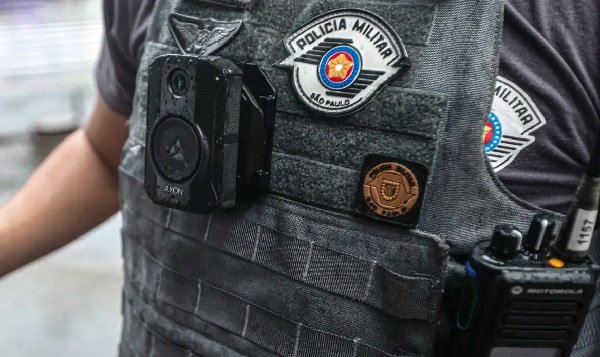Images captured by a vest-mounted body camera worn by a military police officer reveal the fatal shooting of a suspect who had already surrendered during a raid on Thursday (10/07) in Paraisópolis, a favela located in the southern zone of São Paulo. The footage led to the arrest of two police officers involved in the raid, which authorities have classified as illegal.
This Content Is Only For Subscribers
To unlock this content, subscribe to INTERLIRA Reports.
Execution Captured on Camera
The video shows Igor Oliveira de Moraes Santos, 24, being shot twice by police. In the first instance, he is crouched behind a bed with his arms raised when officers open fire. The second shot occurs as he begins to stand up, his right hand still raised. A red spot appears visible on the left side of his chest moments before he is hit again. At least four military police officers from the ROCAM (Motorcycle Tactical Patrol) are seen inspecting homes in the community. One of them later submitted a false police report, omitting the suspect’s surrender and falsely claiming that Santos reached for a weapon at his waist.
Community Protests
The killing triggered immediate outrage in Paraisópolis. On Thursday night, residents protested by setting fires to tires and debris, overturning vehicles, and blocking roads. The unrest prompted another police operation in which a second man was killed, and a ROTA (Tobias de Aguiar Ostensive Patrol) officer was injured.
Officers Forgot They Were Being Recorded
The body camera footage suggests that the officers involved may have forgotten—or not realized—that their actions were being recorded. The camera beeped to indicate it was activated only after four shots had already been fired. The sound appears to alert the officers to the device’s presence. Two of them are heard warning others about the COPs, an acronym for the operational body cameras. The devices, manufactured by Motorola, can be activated remotely by police commanders or automatically via Bluetooth within a 20-meter radius when one nearby is turned on. Each time a camera is activated, it also retrieves the previous 90 seconds of footage, capturing key moments that might otherwise go undocumented.
Escalating Police Lethality
The case has reignited debate around the rising police lethality under Governor Tarcísio de Freitas (Republicans) and his Secretary of Public Security, Guilherme Derrite (Progressistas). In 2024, the number of police killings in São Paulo will rise by 65%. Despite this increase, punitive measures remain rare. In many instances, officers return to duty just months after being involved in fatal and controversial incidents. A study published last year by Débora Nachmanowicz, a law scholar from the University of São Paulo (USP), examined 1,293 investigations and lawsuits filed in São Paulo’s Court of Justice involving deaths caused by military police. The study found that 85% of these cases were dismissed, only 10% led to formal charges, and fewer than 2% resulted in convictions.
Analysis:
The events in Paraisópolis reveal the persistent challenges related to police violence and accountability in Brazil, particularly within marginalized urban communities. The footage from the body camera shows a troubling instance of extrajudicial execution, carried out even as the suspect showed clear signs of surrender. This undermines the credibility of public security institutions and deepens the mistrust between law enforcement and the populations they are meant to serve—especially in favelas historically subjected to disproportionate state violence.
The deployment of body cameras was intended to provide greater transparency and curb abuses, but the incident shows how easily such safeguards can be undermined—whether through delayed activation or intentional omission in official reports. The officers’ apparent surprise upon realizing the device was recording reflects a lack of internal culture of accountability.




